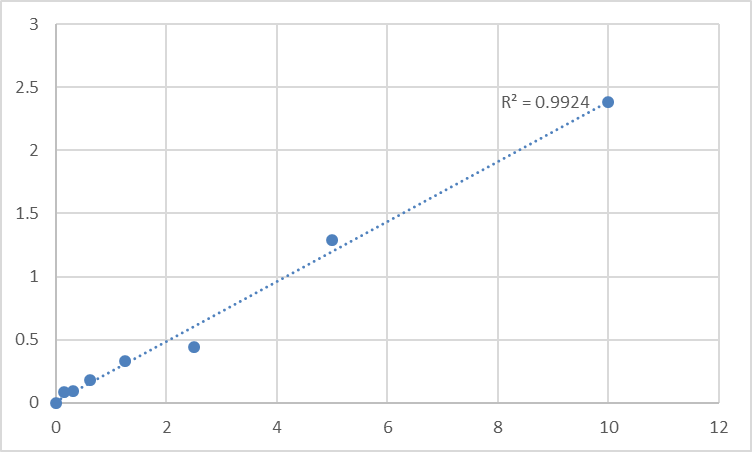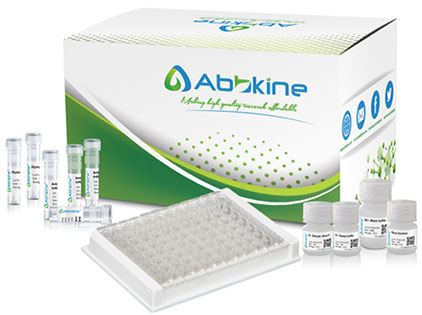| Product name | Human Tumor protein 63 (TP63) ELISA Kit |
| Reactivity | Human |
| Applications | ELISA |
| Applications notes | This Human Tumor protein 63 (TP63) ELISA Kit employs a two-site sandwich ELISA to quantitate TP63 in samples. An antibody specific for TP63 has been pre-coated onto a microplate. Standards and samples are pipetted into the wells and anyTP63 present is bound by the immobilized antibody. After removing any unbound substances, a biotin-conjugated antibody specific for TP63 is added to the wells. After washing, Streptavidin conjugated Horseradish Peroxidase (HRP) is added to the wells. Following a wash to remove any unbound avidin-enzyme reagent, a substrate solution is added to the wells and color develops in proportion to the amount of TP63 bound in the initial step. The color development is stopped and the intensity of the color is measured. |
| Detection method | Colorimetric |
| SampleType | Cell culture supernatants, Other biological fluids, Plasma, Serum |
| Assay type | Sandwich ELISA (quantitative) |
| Assay duration | Multiple steps standard sandwich ELISA assay with a working time of 3-5 hours. It depends on the experience of the operation person. |
| Alternative | TP63; AIS; B(p51A); B(p51B); EEC3; KET; LMS; NBP; OFC8; RHS; SHFM4; TP53CP; TP53L; TP73L; p40; p51; p53CP; p63; p73H; p73L; OTTHUMP00000209738; OTTHUMP00000209740; amplified in squamous cell carcinoma; chron |
| Kit components | • Human Tumor protein 63 microplate • Human Tumor protein 63 standard • Human Tumor protein 63 detect antibody • Streptavidin-HRP • Standard diluent • Assay buffer • HRP substrate • Stop solution • Wash buffer • Plate covers |
| Features & Benefits | Human Tumor protein 63 (TP63) ELISA Kit has high sensitivity and excellent specificity for detection of Human TP63. No significant cross-reactivity or interference between Human TP63 and analogues was observed. |
| Calibration range | Please inquire |
| Limit of detection | Please inquire |
| Usage notes | • Do not mix components from different kit lots or use reagents beyond the kit expiration date. • Allow all reagents to warm to room temperature for at least 30 minutes before opening. • Pre-rinse the pipet tip with reagent, use fresh pipet tips for each sample, standard and reagent to avoid contamination. • Unused wells must be kept desiccated at 4 °C in the sealed bag provided. • Mix Thoroughly is very important for the result. It is recommended using low frequency oscillator or slight hand shaking every 10 minutes. • It is recommended that all samples and standards be assayed in duplicate or triplicate. |
| Storage instructions | The unopened kit should be stored at 2 - 8°C. After opening, please store refer to protocols. |
| Shipping | Gel pack with blue ice. |
| Precautions | The product listed herein is for research use only and is not intended for use in human or clinical diagnosis. Suggested applications of our products are not recommendations to use our products in violation of any patent or as a license. We cannot be responsible for patent infringements or other violations that may occur with the use of this product. |
| Background | TP63 also known as the p63 gene was discovered 20 years after the the discovery of the p53 tumor suppressor gene and along with p73 constitutes the p53 gene family based on their structural similarity.Tumor protein p63 is a member of the p53 family of transcription factors. p63 mice have several developmental defects which include the lack of limbs and other tissues, such as teeth and mammary glands, which develop as a result of interactions between mesenchyme and epithelium.p63 immunostaining has utility for differentiating prostatic adenocarcinoma (the most common type of prostate cancer) and benign prostatic tissue; normal prostatic glands stain with p63 (as they have basal cells), while the malignant glands in prostatic adenocarcinoma (which lacks these cells) do not. |
| Gene ID | 8626 |
| Alternative | TP63; AIS; B(p51A); B(p51B); EEC3; KET; LMS; NBP; OFC8; RHS; SHFM4; TP53CP; TP53L; TP73L; p40; p51; p53CP; p63; p73H; p73L; OTTHUMP00000209738; OTTHUMP00000209740; amplified in squamous cell carcinoma; chron |
| Accession | Q9H3D4 |

Fig.1. Human Tumor protein 63 (TP63) Standard Curve.

Fig.2. Abbkine ELISA kit is series of sandwich ELISA to quantitate specific protein in samples.
You must be logged in to post a review.
Reviews
There are no reviews yet.